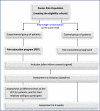Effectiveness of a therapeutic patient education program in improving cancer pain management: EFFADOL, a stepped-wedge randomised controlled trial
- PMID: 31286871
- PMCID: PMC6615097
- DOI: 10.1186/s12885-019-5836-5
Effectiveness of a therapeutic patient education program in improving cancer pain management: EFFADOL, a stepped-wedge randomised controlled trial
Abstract
Background: Despite numerous guidelines, nearly one of two patients with cancer pain remains undertreated, thereby affecting their quality of life. Active patient involvement through Therapeutic Patient Education (TPE) is considered as a relevant strategy to overcoming hurdles in pain management. The aim of the EFFADOL study is to assess the effectiveness of a TPE program in improving cancer pain management.
Methods/design: The EFFADOL study is a stepped-wedge randomised controlled trial. A total of 260 cancer patients with unbalanced background pain will be randomised over the institutional level, i.e. stepped-wedge cluster design. Six clusters will be formed, one at the regional level of "Basse-Normandie" for patients receiving the educational approach by health providers already trained to TPE. Then, five additional centers will be gradually included at the national level, making it possible to compare the "conventional" management of pain (before medical staff training to TPE) with the educational approach (after being trained). The main study parameter is pain interference on daily life assessed with the self-administrated and validated Brief Pain Inventory questionnaire. Secondary objectives comprised the evaluation of patients' adherence to pain education program, the description of pain intensity, pain relief, analgesic adherence and pain emotional impact. Educational dimension of the program will be evaluated through the patients' acquisition of knowledge and skills about their pain and treatment as well as their self-efficacy to participate actively in pain management. The patient's feeling of pain changes will be measured. Finally, the satisfaction of participants and educators will be reported. We hypothetise active involvement of patients in TPE will lead to an improved pain management compared to standard care.
Discussion: Analyzing the impact of a TPE program in cancer pain patients will improve their pain management and quality of life. We expect that the dissemination of our project educational approach through the French territory will be accompanied by long term change in clinical practices with mutual benefit to patients and caregiver-educators.
Trial registration: NCT03297723 , registered: 09/28/2017. Protocol version: Version n°1.1 dated from 2016/09/08.
Keywords: Pain cancer; Pain management; Patient education; Quality of life; Stepped-wedge randomised controlled trial.
Conflict of interest statement
Not applicable.
Figures
References
Publication types
MeSH terms
Associated data
Grants and funding
LinkOut - more resources
Full Text Sources
Medical




